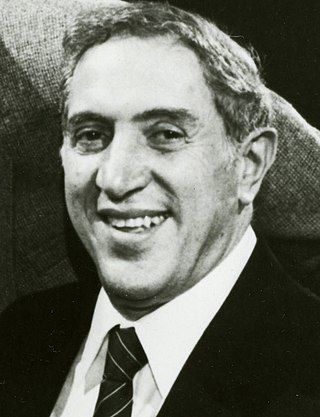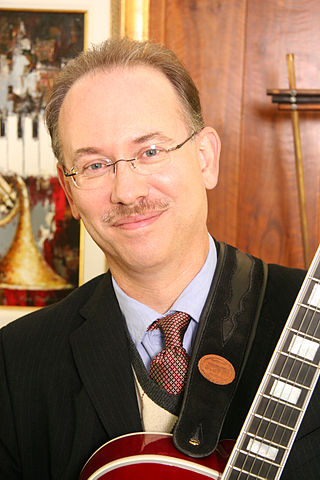
Mister Rogers' Neighborhood is an American half-hour educational children's television series that ran from 1968 to 2001. It was created and hosted by Fred Rogers. Its original incarnation, the series Misterogers debuted in Canada on October 15, 1962, on CBC Television. In 1966, Rogers moved back to the United States creating Misterogers' Neighborhood, later called Mister Rogers' Neighborhood, on the regional Eastern Educational Television Network. The U.S. national debut of the show occurred on February 19, 1968. It aired on NET and its successor, PBS, until August 31, 2001.

The seven-string guitar adds one additional string to the more common six-string guitar, commonly used to extend the bass range or also to extend the treble range.

An eight-string guitar is a guitar with eight strings, or one more than the Russian guitar's seven. Eight-string guitars are less common than six- and seven-string guitars, but they are used by a few classical, jazz, and metal guitarists. The eight-string guitar allows a wider tonal range, or non-standard tunings, or both.

In music, a guitar chord is a set of notes played on a guitar. A chord's notes are often played simultaneously, but they can be played sequentially in an arpeggio. The implementation of guitar chords depends on the guitar tuning. Most guitars used in popular music have six strings with the "standard" tuning of the Spanish classical guitar, namely E–A–D–G–B–E' ; in standard tuning, the intervals present among adjacent strings are perfect fourths except for the major third (G,B). Standard tuning requires four chord-shapes for the major triads.

Guitar tunings are the assignment of pitches to the open strings of guitars, including classical guitars, acoustic guitars, and electric guitars. Tunings are described by the particular pitches that are made by notes in Western music. By convention, the notes are ordered and arranged from the lowest-pitched string to the highest-pitched string, or the thickest string to thinnest, or the lowest frequency to the highest. This sometimes confuses beginner guitarists, since the highest-pitched string is referred to as the 1st string, and the lowest-pitched is the 6th string.

Johnny Costa was an American jazz pianist. Given the title "The White Art Tatum" by fellow jazz pianist Art Tatum, Costa is best known for his work as musical director of the children's television series Mister Rogers' Neighborhood.
Adventure Time was a local children's television show on WTAE-TV 4 in Pittsburgh, Pennsylvania, from 1958 to 1979. It was hosted by Paul Shannon from 1958 until his retirement in 1975, accompanied by guitarist Joe Negri and puppeteer Jim Martin. Negri took over as the show's host from 1975 until 1979.
William Thomas Hillgrove is an American sports broadcaster, radio personality, and sports journalist.

Hillman Library is the largest library and the center of administration for the University Library System (ULS) of the University of Pittsburgh in Pittsburgh, Pennsylvania, United States. Located on the corner of Forbes Avenue and Schenley Drive, diagonally across from the Cathedral of Learning, Hillman serves as the flagship of the approximately 7.1 million-volume University Library System at Pitt.
Nathan Tate Davis was an American jazz multi-instrumentalist who played the tenor saxophone, soprano saxophone, bass clarinet, and flute. He is known for his work with Eric Dolphy, Kenny Clarke, Ray Charles, Slide Hampton and Art Blakey.

The Mary Pappert School of Music is one of the ten degree-granting divisions that comprise Duquesne University in Pittsburgh, Pennsylvania.
An augmented tuning is a musical tuning system for musical instruments that is associated with augmented triads, that is a root note, a major third, and an augmented fifth. The augmented fifth is constructed by stacking the major third with another major third. Consequently, all of the intervals are major thirds.
Ron Anthony was an American jazz guitarist and singer.

Among alternative tunings for guitar, a major-thirds tuning is a regular tuning in which each interval between successive open strings is a major third. Other names for major-thirds tuning include major-third tuning, M3 tuning, all-thirds tuning, and augmented tuning. By definition, a major-third interval separates two notes that differ by exactly four semitones.

Among alternative guitar-tunings, regular tunings have equal musical intervals between the paired notes of their successive open strings.

Ralph Oliver Patt was an American jazz guitarist who introduced major-thirds tuning. Patt's tuning simplified the learning of the fretboard and chords by beginners and improvisation by advanced guitarists. He invented major-thirds tuning under the inspiration of first the atonal music of Arnold Schoenberg and second the jazz of John Coltrane and Ornette Coleman.

Repetitive tunings are a type of alternative tunings for the guitar. A repetitive tuning begins with a list of notes that is duplicated, either at unison or at higher octaves.

Marty Ashby is a music producer, concert organizer, and jazz guitarist. Since 1987 he has been the executive producer of MCG Jazz, a program of the Manchester Craftsmen's Guild, where he has produced more than 2,000 concerts and 40 recordings on the MCG Jazz label, including five Grammy Award winners. He has also performed with a number of jazz groups and is an adjunct professor at Oberlin College.













